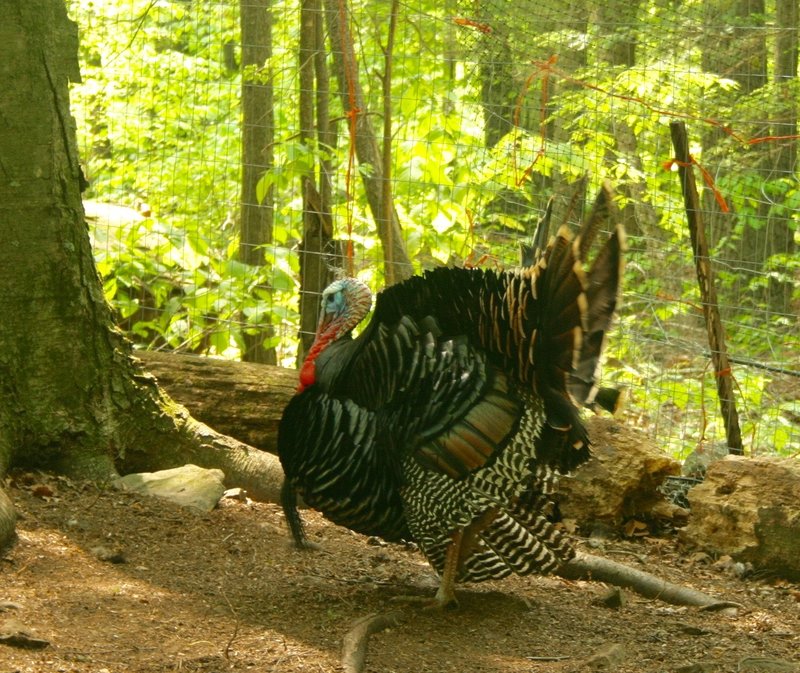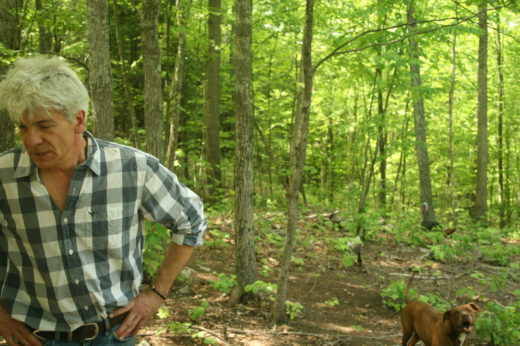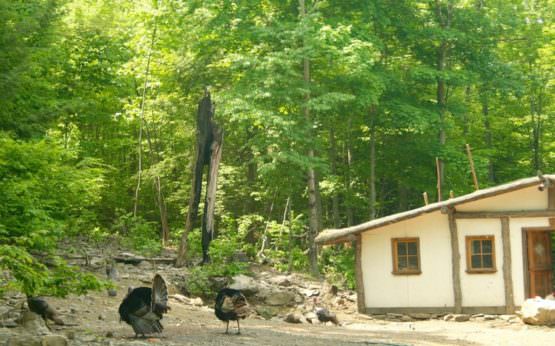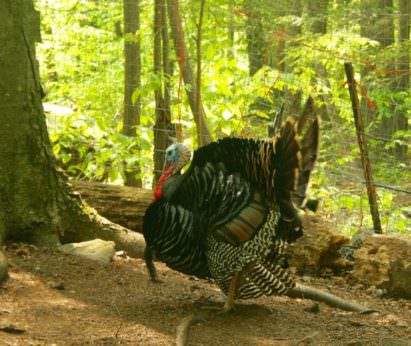Staten Island’s Flock of Feral Turkeys Retire Upstate
The big city just wasn’t big enough for these turkeys. That’s why a flock of Staten Island birds is heading for the hills.
Staten Island’s Flock of Feral Turkeys Retire Upstate
The big city just wasn’t big enough for these turkeys. That’s why a flock of Staten Island birds is heading for the hills.

I’ve known Andernach, a German-born architectural designer and furniture maker, for five or so years. He’s always had a bit of a menagerie on his 60 wooded acres in the rural foothills of the Catskill Mountains. He lives on the land, is starting a biodynamic farm, and runs And-Hof Animals, Sanctuary for Farm Animals, which houses 32 hens, 28 roosters, 16 ducks, six goats, two pigs, two geese, and two rabbits (plus five dogs). And now, there are turkeys – Staten Island turkeys, to be exact.
Exactly how several hundred wild turkeys ended up living on Staten Island has become something of an urban legend. The story goes that a man had a few birds as pets between 10 and 15 years ago, then released them when he got tired of caring for them. Over the years, the turkeys continued to breed and their numbers steadily increased until they could be found roaming the beaches at the south end of the island, in the Dongan Hills and Ocean Breeze neighborhoods, and on the grounds of Staten Island University Hospital.
Initially the feral turkeys were a novelty but as the flock grew, the birds gained pariah status. Angry residents complained about them, especially their tendency to wander onto roadways causing traffic snarls. Eventually, borough officials pressured the state to do something about the birds, and animal welfare groups took notice after a few dozen were rounded up and slaughtered by the USDA.
In late 2013, Andernach, who has run his animal sanctuary for four years, came across Turkey Watch: SAVE the Staten Island Turkeys’ Facebook page. He contacted the organization to say he would be willing to take the birds in. But it turned out to be more difficult than Andernach had anticipated. The New York State Department of Environmental Conservation (DEC) wasn’t actually all that eager to relocate the birds.
“Supposedly they are hybrids that have interbred with domestic turkeys,” says Andernach, as we walked his property among crowing roosters, barking dogs, and honking geese. “Plus, they have lived all their lives in a residential, urban environment. The DEC was concerned that the turkeys would not be able to survive in the wild.”

With the help of David Karopkin, a wildlife activist with Goosewatch NYC, and Brian Shapiro, the New York state director for The Humane Society for the United States, Andernach sat down with the DEC in April 2014 to hammer out a deal for 100 of the more than 300 birds on the island. Andernach agreed to a number of stipulations, including clipping the birds’ wings so they wouldn’t fly away, fencing in a two-acre area, and building a shelter. DEC officials came out to inspect the site. From start to finish the process took about a year and cost around $12,000. In December 2014, 100 turkeys were captured on Staten Island and transported to the sanctuary by the DEC.


The story doesn’t end here. The DEC contacted Andernach last fall and asked if he could take in more of the turkeys. This meant fencing in more land and building a second turkey shelter since the first batch of turkeys had become an established flock and needed to be kept separate. Thirty turkeys from the second shipment arrived between December and April of this year. The rest, which may be as many as 180 to 250 total, are supposed to arrive this fall, requiring a third enclosure.
The turkeys are doing fine, Andernach says, and have quickly adjusted to life in the country. In the sun-dappled woods, the toms put on showy displays and slowly waddle around like dandies on a city street, secure in the knowledge that they had finally arrived. They’ll live out their lives in peace away from the big city hassles of cars, pedestrians, and bureaucrats. It helps that they’re getting the royal treatment.
“They have free room service and they don’t even have to ring the buzzer,” quips Andernach, who says he spent about $8,000 on turkey feed alone last year. The animal sanctuary in the process of becoming a not-for-profit, but right now funding is still coming out of pocket, he says. You can donate to the organization here.
Follow us

This work is licensed under a Creative Commons Attribution-NoDerivatives 4.0 International License.
Want to republish a Modern Farmer story?
We are happy for Modern Farmer stories to be shared, and encourage you to republish our articles for your audience. When doing so, we ask that you follow these guidelines:
Please credit us and our writers
For the author byline, please use “Author Name, Modern Farmer.” At the top of our stories, if on the web, please include this text and link: “This story was originally published by Modern Farmer.”
Please make sure to include a link back to either our home page or the article URL.
At the bottom of the story, please include the following text:
“Modern Farmer is a nonprofit initiative dedicated to raising awareness and catalyzing action at the intersection of food, agriculture, and society. Read more at <link>Modern Farmer</link>.”
Use our widget
We’d like to be able to track our stories, so we ask that if you republish our content, you do so using our widget (located on the left hand side of the article). The HTML code has a built-in tracker that tells us the data and domain where the story was published, as well as view counts.
Check the image requirements
It’s your responsibility to confirm you're licensed to republish images in our articles. Some images, such as those from commercial providers, don't allow their images to be republished without permission or payment. Copyright terms are generally listed in the image caption and attribution. You are welcome to omit our images or substitute with your own. Charts and interactive graphics follow the same rules.
Don’t change too much. Or, ask us first.
Articles must be republished in their entirety. It’s okay to change references to time (“today” to “yesterday”) or location (“Iowa City, IA” to “here”). But please keep everything else the same.
If you feel strongly that a more material edit needs to be made, get in touch with us at [email protected]. We’re happy to discuss it with the original author, but we must have prior approval for changes before publication.
Special cases
Extracts. You may run the first few lines or paragraphs of the article and then say: “Read the full article at Modern Farmer” with a link back to the original article.
Quotes. You may quote authors provided you include a link back to the article URL.
Translations. These require writer approval. To inquire about translation of a Modern Farmer article, contact us at [email protected]
Signed consent / copyright release forms. These are not required, provided you are following these guidelines.
Print. Articles can be republished in print under these same rules, with the exception that you do not need to include the links.
Tag us
When sharing the story on social media, please tag us using the following: - Twitter (@ModFarm) - Facebook (@ModernFarmerMedia) - Instagram (@modfarm)
Use our content respectfully
Modern Farmer is a nonprofit and as such we share our content for free and in good faith in order to reach new audiences. Respectfully,
No selling ads against our stories. It’s okay to put our stories on pages with ads.
Don’t republish our material wholesale, or automatically; you need to select stories to be republished individually.
You have no rights to sell, license, syndicate, or otherwise represent yourself as the authorized owner of our material to any third parties. This means that you cannot actively publish or submit our work for syndication to third party platforms or apps like Apple News or Google News. We understand that publishers cannot fully control when certain third parties automatically summarize or crawl content from publishers’ own sites.
Keep in touch
We want to hear from you if you love Modern Farmer content, have a collaboration idea, or anything else to share. As a nonprofit outlet, we work in service of our community and are always open to comments, feedback, and ideas. Contact us at [email protected].by Andrew Amelinckx, Modern Farmer
May 31, 2016
Modern Farmer Weekly
Solutions Hub
Innovations, ideas and inspiration. Actionable solutions for a resilient food system.
ExploreExplore other topics
Share With Us
We want to hear from Modern Farmer readers who have thoughtful commentary, actionable solutions, or helpful ideas to share.
SubmitNecessary cookies are absolutely essential for the website to function properly. This category only includes cookies that ensures basic functionalities and security features of the website. These cookies do not store any personal information.
Any cookies that may not be particularly necessary for the website to function and are used specifically to collect user personal data via analytics, ads, other embedded contents are termed as non-necessary cookies.